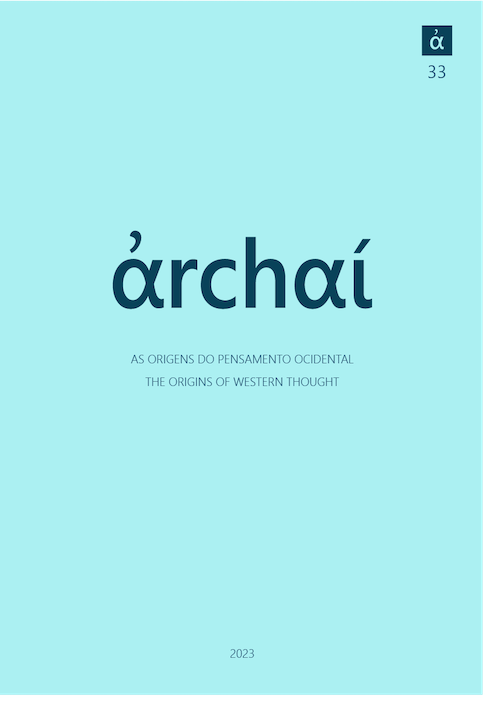The Distinction between Philosophy and the kata philosophian logos in Stoicism
DOI:
https://doi.org/10.14195/1984-249X_33_29Keywords:
Discourse, Philosophical teaching, Chrysippus, Reason, Zeno of TarsusAbstract
This article answer what could be the distinction that the Stoics established between philosophy and the kata philosophian logos, according to the report by D.L., VII, 39-41. In this place I distance from the scholars who consider that the distinction is ontological, this is, that the kata philosophian logos refers to the discursive presentation of Stoic dogmas, whose nature is incorporeal, while the philosophy refers to a disposition of the soul, whose nature is corporeal. I rather propose that both are dispositiones or states of the rational part of the soul and that the difference is in the degree of perfection that they have accomplished.
Downloads
References
ANNAS, J. (2007). Ethics in Stoic Philosophy. Phronesis 52, n. 1, p. 58-87.
ARMISEN-MARCHETTI, M. (2020). La philosophie selon Sénèque: apprentissage ou révélation? In: AYGON, J.; COURTIL, J.; RIPOLL F. (eds.), Seneca Saepe Noster, Articles de Mireille Armisen-Marchetti sur l´oeuvre de Sénèque (1981-2013) réunis en son honneur. Bordeaux, Ausonius Éditions.
ARNIM, I. (1964). Stoicorum Veterum Fragmenta (=SVF). 3 vols. Stuttgard, Teubner.
BARNES, J. (1999). Language. In: ALGRA, K.; BARNES, J.; et al (eds.). The Cambridge History of Hellenistic Philosophy Cambridge, Cambridge University Press, p. 193-213.
BOERI, M.; SALLES, R. (2014). Los Filósofos Estoicos: Ontología, lógica, física y ética (= BS). Sankt Augustin, Academia Verlag.
BOYS-STONES, G. R. (2001). Post-Hellenistic Philosophy: A Study of its Development from the Stoics to Origen Oxford/ New York, Oxford University Press.
BOYS-STONES, G. R. (2003). The Stoic´s Two tipes of Allegory. In: BOYS-STONES, G. R. (ed.). Metaphor, Allegory and the Classical Tradition Oxford/ New York, Oxford University Press, p. 189-216
BRITTAIN, C. (2001). Philo of Larissa Oxford/New York, Oxford University Press.
BRITTAIN, C. (2005). Common Sense: Concepts, Definition and Meaning in and out of the Stoa. In: FREDE, D.; INWOOD, B. (eds.). Language and Learning, Philosophy of Language in the Hellenistic Age Cambridge, Cambridge University Press , p. 164-209.
BROUWER, R. (2014). The Stoic Sage, the early stoics on wisdom, sagehood and Socrates. Cambridge, Cambridge University Press .
CHERNISS, H. (1976). Plutarch. Moralia, v. 13, n. 2. Cambridge/Massachusetts/London, Harvard University Press.
DOMARADZKI, M. (2012). Theological Etymologizing in the Early Stoa. Kernos 25, p. 125-48.
DORANDI, T. (ed.) (2013). Diogenes Laertius. Lives of Eminent Philosophers Cambridge, Cambridge University Press .
DYSON, H. (2009). Prolepsis and Ennoia in the Early Stoa New York/Berlin, Walter de Gruyter.
FREDE, M. (1994). The Stoic Conception of Reason. In: BOUDOURIS, K. (ed.). Hellenistic Philosophy, v. 2. Athens, International Center for Greek Philosophy and Culture, p. 50-63.
HADOT, P. (1979). Les divisions des parties de la philosophie dans lʼAntiquité. Museum Helveticum 36, P. 201-223.
HADOT, P. (1991). Philosophie, discours philosophique, et divisions de la philosophie chez les Stoiciens. Revue Internationale de Philosophie 45, n. 178, p. 205-219.
HADOT, P. (2006). Ejercicios Espirituales y Filosofía Antigua Trad. Javier Palacio. Madrid, Ediciones Siruela.
HÜLSER, K. (1987). Die Fragmente zur Dialektik der Stoiker (=FDS). Vol 1 y 2. Stuttgart / Bad Cannstatt, Friedrich Frommann Verlag.
IERODIAKONOU, K. (1993). The Stoic Division of Philosophy. Phronesis 38, n. 1, p. 57-64.
IERODIAKONOU, K. (2019). Dialectic as a Subpart of Stoic Philosophy. In: GOURINAT, J. B.; IERODIAKONOU, K. (eds.). Dialectic after Plato and Aristotle Cambridge, Cambridge University Press .
ISNARDI PARENTE, M. (1982). Senocrate-Ermodoro: Frammenti. Napoli, Bibliopolis.
LONG, A. A.; SEDLEY, D. N. (1987). The Hellenistics Philosophers (=LS), v. 1. Cambridge, Cambridge University Press .
LONG, A. A. (1996). Stoic Studies New York, Cambridge University Press.
LUTZ, C. E. (1947). Musonius Rufus “The roman Socrates”. In: BELLINGER, A. (ed.) Yale Classical Studies, v. 10. New Haven, Yale University Press. p. 32-128.
POHLENZ, M. (1964). Die Stoa Göttingen, Vandenhoeck & Ruprecht.
SANDBACH, F. H. (1930). Ennoia and ΠΡΟΛΗΨΙΣ in the Stoic theory of Knowledge. The Classical Quarterly 24, n. 1, p. 44-51.
SCHENKEVELD, D. M. (1999). Language. In: ALGRA, K.; BARNES, J.; et al (eds.). The Cambridge History of Hellenistic Philosophy Cambridge, Cambridge University Press , p. 177-193.
SCHOFIELD, M. (1980). Preconception, Argument, and God. In: SCHOFIELD, M.; BURNYEAT, M.; et al (eds.), Doubt and Dogmatism, Studies in Hellenistic Epistemology. Oxford, Oxford University Press, p. 283-308.
SELLARS, J. (2007). Stoic Practical Philosophy in the Imperial Period. In: SORABJI, R.; SHARPLES R. W. (eds.). Greek and Roman Philosophy 100 BC- 200 AD London, University of London/Institute of Classical Studies, p. 115-140.
SELLARS, J. (2009). The Art of Living: The Stoics on the Nature and Function of Philosophy, 2ed. London/New Delhi/New York/Sydney, Bloomsbury.
WESTMAN, R. (1959). Plutarchus. Plutarchi moralia, v. 6.2, 2nd edn., Leipzig, Teubner.
Downloads
Published
How to Cite
Issue
Section
License
Copyright (c) 2023 José Luis Ponce Pérez

This work is licensed under a Creative Commons Attribution 4.0 International License.
Given the public access policy of the journal, the use of the published texts is free, with the obligation of recognizing the original authorship and the first publication in this journal. The authors of the published contributions are entirely and exclusively responsible for their contents.
1. The authors authorize the publication of the article in this journal.
2. The authors guarantee that the contribution is original, and take full responsibility for its content in case of impugnation by third parties.
3. The authors guarantee that the contribution is not under evaluation in another journal.
4. The authors keep the copyright and convey to the journal the right of first publication, the work being licensed under a Creative Commons Attribution License-BY.
5. The authors are allowed and stimulated to publicize and distribute their work on-line after the publication in the journal.
6. The authors of the approved works authorize the journal to distribute their content, after publication, for reproduction in content indexes, virtual libraries and similars.
7. The editors reserve the right to make adjustments to the text and to adequate the article to the editorial rules of the journal.



